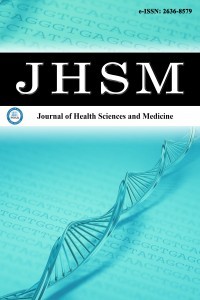Extra corporeal membrane oxygenation therapy in acute respiratory distress syndrome due to Coronavirus-2019 (COVID-19): a retrospective study
Extra corporeal membrane oxygenation therapy in acute respiratory distress syndrome due to Coronavirus-2019 (COVID-19): a retrospective study
COVID-19, extracorporeal membrane oxygenations, respiratory distress syndrome mortality, prognosis,
___
- World Health Organization: Clinical management of severe acute respirato ry infection when novel coronavirus (nCoV) infection is suspected. Available from: https://www.who.int/emergencies/diseases/novel-coronavirus-2019/technical-guidance
- Crotti S, Bottino N, Spinelli E: Spontaneous breathing during veno-venous extracorporeal membrane oxygenation. J Thorac Dis. 2018;10(Suppl. 5):S661–669.
- Kurihara C, Walter JM, Singer BD, et al. Extracorporeal membrane oxygenation can successfully support patients with severe acute respiratory distress syndrome in lieu of mechanical ventilation. Crit Care Med. 2018;46(11):e1070-e1073.
- Extracorporeal Life Support Organization (ELSO) report in 2018. Available from: https://www.elso.org/
- Vieira J, Frakes M, Cohen J, Wilcox S. Extracorporeal membrane oxygenation in transport part 2: complications and troubleshooting. Air Med J. 2020;39(2):124–132
- Lim JKB, Qadri SK, Toh TSW, Lin CB, Mok YH, Lee JH. Extracorporeal membrane oxygenation for severe respiratory failure during respiratory epidemics and pandemics: a narrative review. Ann Acad Med Singap. 2020;49(4):199-214.
- Barbaro RP, MacLaren G, Boonstra PS, et al. Extracorporeal Life Support Organization. Extracorporeal membrane oxygenation support in COVID-19: an international cohort study of the Extracorporeal Life Support Organization registry. Lancet. 2020;396(10257):1071-1078.
- Combes A, Hajage D, Capellier G, et al. Extracorporeal membrane oxygenation for severe acute respiratory distress syndrome. N Engl J Med. 2018;378(21):1965-1975.
- Schmidt M, Hajage D, Lebreton G, et al. Groupe de recherche clinique en reanimation et soins intensifs du patient en insuffisance respiratoire aigue (GRC-RESPIRE) Sorbonne Université; Paris-Sorbonne ECMO-COVID investigators. Extracorporeal membrane oxygenation for severe acute respiratory distress syndrome associated with COVID-19: a retrospective cohort study. Lancet Respir Med. 2020;8(11):1121-1131.
- Schmidt M, Pham T, Arcadipane A, et al. Mechanical ventilation management during extracorporeal membrane oxygenation for acute respiratory distress syndrome. an international multicenter prospective cohort. Am J Respir Crit Care Med. 2019;200(8):1002-1012.
- Henry BM, de Oliveira MHS, Benoit S, Plebani M, Lippi G. Hematologic, biochemical and immune biomarker abnormalities associated with severe illness and mortality in coronavirus disease 2019 (COVID-19): a meta-analysis. 2020;58(7):1021-1028.
- Terpos E, Ntanasis-Stathopoulos I, Elalamy I, et al. Hematological findings and complications of COVID-19. Am J Hematol. 2020;95(7):834-847.
- Burrell AJC, Lubnow M, Enger TB, et al. The impact of venovenous extracorporeal membrane oxygenation on cytokine levels in patients with severe acute respiratory distress syndrome: a prospective, observational study. Crit Care Resusc. 2017;19(Suppl 1):37-44.
- Jacobs JP, Stammers AH, St Louis J, et al. Extracorporeal membrane oxygenation in the treatment of severe pulmonary and cardiac compromise in coronavirus disease 2019: experience with 32 patients. ASAIO J. 2020;66(7):722-730.
- Henry BM. COVID-19, ECMO, and lymphopenia: a word of caution. Lancet Respir Med. 2020;8(4):e24.
- Ruan Q, Yang K, Wang W, Jiang L, Song J. Clinical predictors of mortality due to COVID-19 based on an analysis of data of 150 patients from Wuhan, China. Intensive Care Med. 2020;46(5):846-848.
- Mehta P, McAuley DF, Brown M, Sanchez E, Tattersall RS, Manson JJ. HLH Across Speciality Collaboration, UK. COVID-19: consider cytokine storm syndromes and immunosuppression. Lancet. 2020;395(10229):1033-1034.
- Tran A, Fernando SM, Rochwerg B, et al. Prognostic factors associated with mortality among patients receiving venovenous extracorporeal membrane oxygenation for COVID-19: a systematic review and meta-analysis. Lancet Respir Med. 2022:S2213-2600(22)00296-X.
- Uysal E, Seğmen F, Ulubaşoğlu P, Zengin E.N, Erdem D. The progress of chronic renal disease patients followed by the diagnosis of COVID-19 in ICU. J Health Sci Med. 2022;5(5):1447-1452
- Yayın Aralığı: Yılda 6 Sayı
- Başlangıç: 2018
- Yayıncı: MediHealth Academy Yayıncılık
Quality, reliability, and content assessment of YouTube™ videos associated with aphasia
İbrahim Can YAŞA, Gözde MALKOÇ
Mehmet Çağatay GÜRKÖK, Ozlemoner ÖNER, Ferhan DEMİRER AYDEMİR, Özge KUZGUN, Alkan DURMUŞ, Sabri ERDEM, Necati GÖKMEN
Histopathological evaluation of the effects of sildenafil on organ damage in a diabetic rat model
Mehmet KARA, Halit BAYKAN, Esra ÖNAL, Ayşegül Burçin YILDIRIM, Derya KARABULUT
The relationship between osteoporosis and non-dipper hypertension in postmenopausal women
Tolga ÇAKMAK, İskender KADİFE, Erkan AYHAN, Turgay IŞIK
A scientometric analysis and visualization of Pott's disease; 2000-2021
Selçuk YILMAZ, Sevil ALKAN, Süleyman Kaan ÖNER, Nihat Demirhan DEMİRKIRAN, Numan KUYUBAŞI, Cengiz ARSLAN
Can hematologic parameters predict isolated oligohydramnios and isolated polyhydramnios?
Mustafa Bertan DEMİR, Şadan TUTUŞ, Cevat Rifat CÜNDÜBEY
Derya KORKMAZ, Tülay KÖKEN, Halit Buğra KOCA, Semiha ORHAN, Neşe DEMİRTÜRK
Hatice YÜCELER KAÇMAZ, Hilal KAHRAMAN, Sibel AKIN, Erdoğan SÖZÜER
